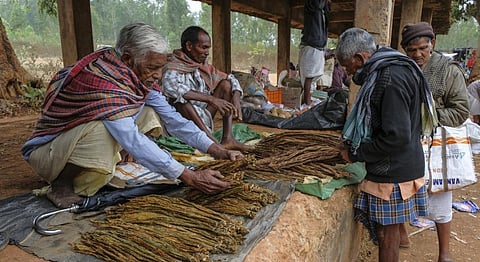Rights ensured under FRA are not just ‘enjoyment rights’
Some 83 tribal farmers of Girjai (V) in Bajarhatnur Mandal, Adilabad district (Telangana) were being made to go around government offices, seeking permission for digging bore wells in their own titled forest lands.
Kumra Darmu and Pendor Kisan, two of these 83 farmers, had to finally seek the intervention of the Project Officer, Integrated Tribal Development Agency, in Utnoor against the objections of forest officials in digging bore wells in their forest patta lands.
These are not stray cases in Telangana. Similar requests for permission to dig bore wells in the forest title lands of 694 tribal farmers in Bhadradri Kothagudem district have not yet been cleared by the district authorities.
It is not an uncommon argument of the authorities, more particularly forest bureaucrats, that the rights recognised under the Scheduled Tribes and Other Traditional Forest Dwellers (Recognition of Rights) Act or FRA 2006 only permit the right-holders to enjoy their rights over forest lands, but not ownership of the forest land over which the forest dweller has been issued title.
A similar perception is also held among the higher tribal welfare officials in the country which was reflected during a recent discussion held on the implementation of forest rights under “Vikasit Bharat”, an initiative of the Union government.
It seems this understanding is emanating from the idea that that the State is the only owner of all forest land, unlike revenue lands, and the rights ensured under FRA are only ‘enjoyment rights’.
This position of the administrative authorities negates the intended ownership rights of the forest dwellers and the Gram Sabhas recognised over forest lands.
In fact, state governments are required to ensure livelihood opportunities are made available and enhanced on lands of forest dweller farmers by involving all the relevant departments under Rule 16 of FRA. The state government is to carry these out by providing post-claim support for the improvement of productivity and land development of the recognised forest lands of title holders.
FRA was enacted in 2006 by Parliament to undo the historic injustice done to Scheduled Tribes and other traditional forest dwellers in the country. It recognises the individual, community, and community forest resources rights of tribals and other traditional forest dwellers in the forest areas whether notified or not. Titles are issued to individuals for habitation and for self-cultivation. These rights are heritable but not alienable or transferable. Titles for community rights and community resource rights are issued to the concerned Gram Sabhas.
As per section 6(6) of the FRA, the District Level Committee (DLC) is to give the final nod of approval of the record of forest rights. Under Rule 8(h) of Rules 2012, it is the responsibility of the DLC to issue title under the Act and ensure that these rights are duly entered in the record of rights of both the revenue and forest departments under the relevant state laws as per Rule 12 A of the amended Rules 2012. The forest rights are conferred free of all encumbrances [Sec.4(7)].
The misreading of the forest title deed, has become a stumbling block to the entitlements of title holders. This is to be seen from several provisions of other enactments made either by Parliament or state legislatures that are inter-related to forest rights.
The Right to Fair Compensation and Transparency in Land Acquisition, Rehabilitation and Resettlement Act, 2013 (LARR 2013) ensures compensation to those whose forest lands are acquired for projects by user agencies, whether belonging to the public or private sector.
Notably, Section 3 r(ii) of LARR 2013 defines ‘land owner’. It includes any person who is issued titles for forest rights under FRA 2006. The forest land title holder is considered as ‘land owner’ on par with a title holder on Ryotwari revenue lands. Ryotwari was a system of land revenue implemented in British India.
Therefore, considering the rights recognised under FRA only as ‘enjoyment rights’ over forest lands is indeed gross misinterpretation of the law. It also amounts to a violation of the provisions of FRA, which is a punishable offence. Moreover, the provisions of FRA are in addition to the beneficial provisions of other legislations, not in derogation to them. Hence, the violations of FRA are liable to be construed as violations of these other laws.
Palla Trinadha Rao is a lawyer working for tribal rights
Views expressed are the author’s own and don’t necessarily reflect those of Down To Earth


